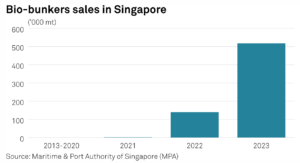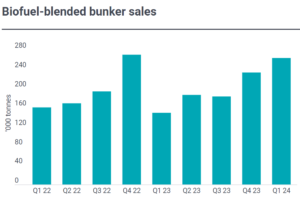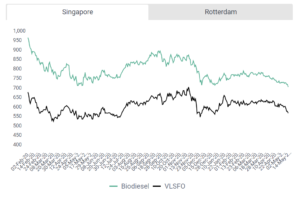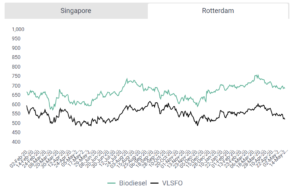The potential of the biobunker market worldwide
Understand how much the biobunker market can evolve in the coming years, what drives this market, challenges for the future and more.
Bunker is a marine fuel that powers cargo and passenger ships. Biobunker is an alternative that partially replaces the diesel used in bunker with biodiesel produced from vegetable oils or animal fats. Its aim is to increase the diversity of the energy supply for these ships, as well as reducing carbon emissions by using a renewable source.
Currently, biobunker is only used in blends with traditional diesel. However, the market for this fuel is evolving, and its demand is expected to grow in the coming years. In this article, we’ll explore the potential of this biofuel in the energy market, its future challenges and more. Have a good read!
What could drive demand for biobunkers?
Global production and demand for biofuels has been growing all over the world. Global policies have become the biggest incentives for the use of biobunkers and other clean sources, especially in the fight against climate change. The advantage of the biobunker in this sustainable scenario is that it offers a “drop-in” solution, i.e. it can be used directly in ship engines without the need for technological adaptation.
Initiatives to control carbon emissions are already underway in the European Union. The continent has implemented an emissions trading system for large ships, with the aim of regulating greenhouse gas emissions in maritime transport.
In addition, Europe will implement FuelEU Maritime on January 1, 2025. The program will increase the share of biobunkers in the fuel mix of international maritime transport within the EU. The initiative will start with a 2% reduction in carbon emissions in 2025, rising to 6% in 2030 and reaching 80% by 2050.
Read also:
The ESG (environmental, social, and governance) goals of companies around the world should also drive demand for biobunkers. Many countries are developing ESG-related policies and agreements to encourage sustainable practices.
Bunker Holding, the world’s largest marine fuel trader, expects demand to double by 2025 due to encouraging legislation. According to IEA Bioenergy (part of the International Energy Agency), biodiesel used in biobunkers and biojets will account for almost half of the future expansion of biofuels. The organization predicts that demand for these sources will grow by 38 billion liters by 2028, with emerging countries, especially Brazil, standing out.
The use of biobunkers today
Sustainable initiatives have shown results in encouraging the use of biobunkers. S&P Global reported that demand for biofuel in Singapore, the world’s largest bunkering port, continues to grow. According to data from the local Maritime and Port Authority, biobunker sales will jump from 140,200 tons in 2022 to 518,000 tons in 2023

This evolution in consumption demonstrates the commitment of large maritime companies to adopting cleaner fuels. With net-zero emissions targets becoming more ambitious by 2050, demand for biobunkers is expected to grow steadily.
Initially, most of this demand is expected to be concentrated in the world’s largest ports. In Rotterdam, the Netherlands, total biobunker sales reached 752,000 tons, with the local Maritime Authority reporting growth in demand since the beginning of 2023:

Source: Port of Rotterdam Authority
Read also:
Brazil’s potential in the biobunker market
Brazil, the world’s second largest producer of biofuels, plays an important role in biobunker production. Currently, the country has a potential demand of 4 million tons of marine biofuel per year.
In July 2024, the ANP (National Agency for Petroleum, Natural Gas and Biofuels) authorized Petrobras to sell bunker oil with a 24% biodiesel blend. Tests carried out by the agency indicated a reduction in carbon emissions of between 17% and 19%.
Other companies should follow suit, seeking the same authorization and stimulating the production and demand for biobunkers in Brazil. The IEA predicts that emerging economies, such as the Latin American country, will drive up to 70% of global biofuel growth over the next five years.
Read also:
Cost of production: the main challenge for the future of the biobunker
According to the IEA, biofuels generally cost more than the fossil fuels with which they are mixed. The agency itself estimates that the production costs of advanced biofuels, such as biobunker, vary between 65 and 158 EUR/MWh (megawatt-hour). In comparison, fossil fuels have an average cost of 30-50 EUR/MWh.
The graph below looks at the difference between the prices of biodiesel and VLSFO (Very Low Sulphur Fuel Oil), one of the most widely used marine fuels on the market today:


Source: Argus Media
Read also:
The role of hedging in a booming market
The biobunker offers a promising solution for decarbonizing maritime transport. With the support of governments and companies, this product has great potential for expansion. However, as with any growing market, there are uncertainties, especially when a rapid increase can bring price swings.
Hedging plays a crucial role in protecting against this volatility. It allows companies to protect themselves from price fluctuations by fixing values or limiting potential losses. In the oil market, for example, it is possible to use futures contracts to lock in the sale price for a period, avoiding exposure to volatility.
At Hedgepoint, you can count on energy hedging experts to protect your business. Contact our team and find out more.






